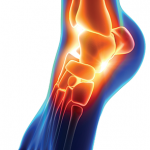CPT codes: 99213 Diagnosis Codes: ICD-9: 715.15, 278.01 ICD-10: M16.12, E66.01, Z68.41 This encounter is coded as 99213 as follows: History—The history of present illness was extended. The review of systems was comprehensive, and no past family social history was documented. This makes the history level expanded problem focused. Examination—There were eight systems examined. This…

Ankle Replacement: Are Patients with Ankle Arthritis Good Candidates?
Ankle arthritis is a debilitating condition that leaves many patients in severe pain and greatly limits their activities. Until recently, the standard treatment for bone-on-bone ankle pain has been ankle fusion, or arthrodesis, in which surgeons literally fuse the bones of the ankle joint together. However, in the past few years, total ankle replacement surgery,…

Heart Rate Variability to Predict Treatment Response in Patients with RA
A growing understanding of the immunomodulatory effect of the autonomic nervous system (ANS) is edging closer to having clinical applications that could one day benefit patients with rheumatoid arthritis (RA). Researchers pursuing this as an alternative path to biomarkers are investigating whether autonomic status can be used to predict response to therapy. Seattle-area rheumatologist and…

Polymyalgia Rheumatica Misdiagnosis Results in Positive Outcome
In late February 2011, a 68-year-old woman visited the rheumatology outpatient clinic. She had been congenitally healthy and had been a field athlete in her early days. Beginning in early January 2011, she became aware of pain in her neck and both shoulders, with pain spreading to her lower back and thighs. She also became…

The ACR’s State-of-the-Art Clinical Symposium: Experts Discuss Jakinibs, Osteoarthritis, Membranous Lupus Nephritis
CHICAGO—With the approval of the Jak inhibitors (i.e., jakinibs) tofacitinib and ruxolitinib—and others being investigated—rheumatologists need to arm themselves with an understanding of these drugs so they can think critically when evaluating them and deciding how to use them, said John O’Shea, MD, chief of the Molecular Immunology and Inflammation Branch of and scientific director…

The ACR’s State-of-the-Art Clinical Symposium: Rheumatic, Malignant Disease Mimics Call for Diligence from Rheumatologists
CHICAGO—David Daikh, MD, PhD, professor of medicine at the University of California San Francisco and chief of the Rheumatology Division at the San Francisco VA Medical Center, said the overlap between malignant disease and rheumatic disease means rheumatologists should stay aware that more may be going on than just a rheumatic disorder. He made his…
International Consensus Statement on the Management & Treatment of IgG4-Related Disease
IgG4-related disease (IgG4-RD) is an immune-mediated fibro-inflammatory condition that affects multiple organs and can lead to tumefactive, tissue-destructive lesions and organ failure. An international panel of experts has released a consensus statement on its management…

Tips for Treating Insomnia in Rheumatology Patients
Chronic insomnia is a common complaint for patients with rheumatic diseases and conditions. In fact, sleep disturbances are among the most common symptoms of both fibromyalgia and rheumatoid arthritis (RA), with more than 50% of chronic pain patients reporting sleep disturbances. Pain combined with insomnia can lead to a vicious cycle, says Ruth Gentry, PhD,…

Glucocorticoid Use for Rheumatoid Arthritis Still Sparks Debate
Glucocorticoids: The Debate Continues Déjà vu … In past decades, rheumatologists have seen, heard, practiced and taught much of what has been argued in the “ongoing debate” on the use of glucocorticoids (GCs) in the management of rheumatoid arthritis (RA).1 It is heartening to note that eminent professors have stuck to their premise all these…

Restoration of Sleep Physiology vs. Sedation for Sleep Disorders, Fibromyalgia
Sleep disturbance is an important medical problem, requiring intervention, not simply to reduce latency to its onset, but to ensure achievement of the depth of sleep that has been documented to restore homeostasis and prevent the falls that are responsible for so much morbidity and mortality.1 Sleep disturbance is present in 50% of people over…
- « Previous Page
- 1
- …
- 19
- 20
- 21
- 22
- 23
- …
- 41
- Next Page »